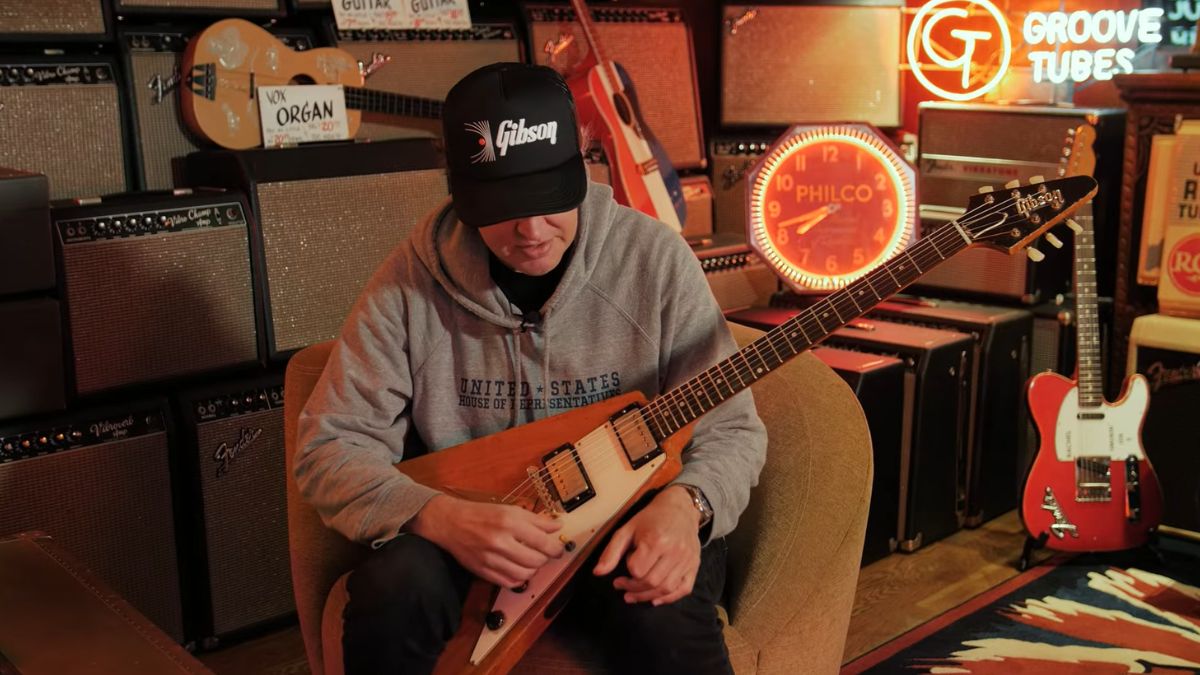“People want to know their family heirlooms are going to a place where they'll be loved and played. I tick those boxes”: 4 highlights from Joe Bonamassa’s epic new Nerdville Museum mini-documentary
From seances and trash bag Flying Vs, to Gibson-inspired interior design, a new Reverb film charts Bonamassa’s growing vintage gear collection – and unearths some fantastic tales along the way
Joe Bonamassa’s love for and knowledge of vintage gear is vast. Recently, he sought to share the stories behind his own legendary guitar collection by inviting online gear retailer Reverb into his Nerdville museum for an ultra-nerdy mini-documentary.
Bonamassa first let Reverb’s camera peruse his gear collection in 2014. Suffice to say, in the intervening eight years, the bluesman has made multiple additions to his collection.
“I look back at the 2014 documentary and that room seems so empty,” Bonamassa reflects early on, “like, where is everything, did I get robbed?!”
The YouTube documentary therefore made for a comprehensive catch-up, which is packed to the rafters with anecdotes involving seances, trash bag guitars, and Korina kitchen cabinets.
Highlights from the near-40-minute film can be found below, but take note: this list is by no means exhaustive. Watch the full video on Reverb's YouTube channel.
The 'Trash Bag' Flying V

Of Bonamassa's many new purchases, a $200,000 Flying V that was found in a trash bag stands out. As JoBo explains, the niece of a Bay Area gospel musician named Gino Landry didn’t know the treasure she had come across when she found the guitar wrapped up in a bin liner among her uncle’s belongings.
She estimated she could get a quick $500 out of it; Bonamassa knew otherwise. A 1958 Gibson Flying V, it is a notably rare example, as it hails from the firm’s original run of Korina Vs. Gibson later switched to mahogany bodies after disappointing initial sales.
All the latest guitar news, interviews, lessons, reviews, deals and more, direct to your inbox!
Though it needed some work to get back up to speed, especially beneath Bonamassa's fingers, the guitar sold for 400x higher than Landy’s original valuation.
Tommy Bolin’s “cursed” Les Paul Standard

That isn't the strangest way he’s accumulated gear, though. Bonamassa also owns a 1960 Gibson Les Paul Standard, formerly belonging to Tommy Bolin, which he fears might be “cursed”.
The instrument was played extensively by Bolin, who wrote one album, Come Taste The Band, with Deep Purple before his passing in December ‘76 aged 25.
During a seance, the seller asked Tommy Bolin's spirit for permission to sell his guitar to the revered bluesman – and his spirit promptly approved of the deal. Soon after, however, the seller buried a duffle bag of cash he earned from the deal somewhere in the Utah desert, before dying unexpectedly in a car crash.
"If you're a treasure hunter," says a perpetually dry-humored Bonamassa, "I'd start in Moab."
Korina kitchen cabinets

Bonamassa may be known for his ability to shred the blues, and his songwriting skills have earned him many accolades, but now he can add ‘interior designer’ to his résumé.
His newly re-modeled kitchen, for instance, includes a full set of Korina kitchen cabinets, which come complete with handles fashioned out of Stop Bar tailpieces plucked from Gibson electric guitars.
As Bonamassa explains, the inspiration came from a story he had heard about Elinor McCarty, the wife of Gibson president Ted McCarty, who oversaw the firm’s golden age of guitar building.
In the light of the poor sales figures of the ‘50s Flying Vs – one of which would end up in Bonamassa’s museum via a trash bag – Elinor took advantage of the left-over Korina.
“Allegedly,” Bonamassa says, “she took the extra Korina from the Gibson factory when they shut down the Vs and Explorers… and built kitchen cabinets.”
Prized possessions
Always on the hunt for new gear, as the above stories attest, Bonamassa has been focusing on re-homing family heirlooms in his quest to acquire more vintage accouterments, veering away from an arguably inflated second-hand market.
“That's the thing I'm into: finding uncirculated things,” he says while holding a Les Paul that had passed through several generations of one family. “There's less of it, but it's still out there.
“People want to know their family heirlooms are going to a place where they'll be appreciated, loved, and played; I tick those boxes.”
A freelance writer with a penchant for music that gets weird, Phil is a regular contributor to Prog, Guitar World, and Total Guitar magazines and is especially keen on shining a light on unknown artists. Outside of the journalism realm, you can find him writing angular riffs in progressive metal band, Prognosis, in which he slings an 8-string Strandberg Boden Original, churning that low string through a variety of tunings. He's also a published author and is currently penning his debut novel which chucks fantasy, mythology and humanity into a great big melting pot.


